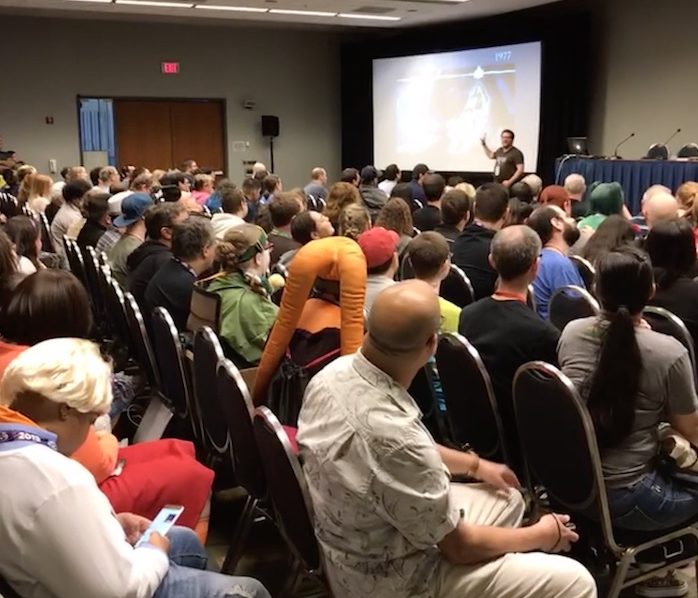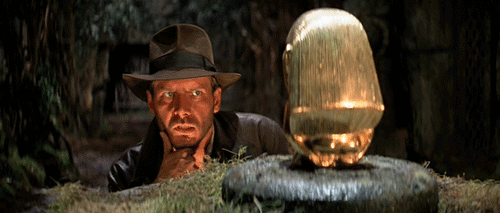
“What advice would you have for someone who wants to write professionally?†is a pretty tall order. It’s a question that, while I love answering it, remains one of the toughest to answer because you are being asked for that “One Ring†kind of answer. What’s the one takeaway you want people to have after meeting you? Well, apart from buying my latest book, there’s no one thing that makes an aspiring author a success. A lot goes into building a professional writing career.
But one thing I’ve rarely, if ever, hear an author offer for advice is this: Learn how to read a room.

If you want to see a really good dramatization of this, watch the Amazon Prime movie, Late Night. It’s a terrific watch for many reasons (like you need any reasons beyond Mindy Kaling and Emma Thompson) but one scene in particular is a masterclass in how to read a room. At a stand-up comedy cancer benefit, late night talk show legend Katherine Newberry (Emma Thompson) takes the stage in an impromptu stand up set, and she is bombing. You watch Newberry look the length of the audience; and the camera switches angles, looking at the world from her perspective. She takes a moment and changes her “opinions on this wacky world†approach to self-deprecating comedy, a change that not only helps her recover gracefully but also makes a connection between her and the audience.
Some of my friends might think it’s not fair that I talk about this as if it were something easy to do. After all, I’ve done stand up. I’ve done improv comedy. I’m trained in theatre. So naturally I have an unfair advantage, right? Sure, those experiences and the risks involved with them have helped me hone my skill; but in reading a room, it starts with paying attention.
Wind the clock back to 2002 when my first book, Morevi, was out and I was working on building a brand and creating a presence for myself…
I was thrilled to be speaking at a book festival in the Northern Virginia area, the topic being “How to Develop an Idea†which, while broad, is a terrific for a panel conversation. On arriving at the event, I meet one of the festival’s organizers along with my Fellow Author™. Now I had read up on my Fellow Author™ — a debut novel from five years prior, and following that with by numerous short stories published in a few magazines and anthologies. As I was working on The Case of the Singing Sword at the time, this meant an established writer and a rookie would be sharing perspectives on turning ideas into bylines. “This should be fun,†I initially thought.

Then, without warning, my Fellow Author™ took charge of the situation…
Fellow Author™: So where will be doing our readings?
Event Organizer: Well, we weren’t really planning on readings. The topic is on how authors develop ideas into stories and novels.
FA™: But I would prefer a reading. I’ve prepared a reading.
EO: The audience is expecting a panel discussion on this topic.
FA™: But I prepared a reading. (turning to me) You have something prepared too, don’t you?
Me: I could do a reading, but the audience is expecting a panel discussion so I say we give the people what they want.
FA™: *shakes her head ruefully* Well, I think they would prefer a reading, but if that’s what you want to do…
Me: Let’s just stick with the panel discussion. It’ll be fun.
We took the stage with about twenty people in the audience. We introduce ourselves, and then my Fellow Author™ opens the panel discussion…
FA™: So, our panel topic is about how to take an idea and develop it to a fully realized work, like a short story or novel. Well, the process usually starts with an idea you can get from anywhere and you just run with it, like when a quote suddenly pops into your head. And when that happens, the end result is this…
And my Fellow Author™ proceeded to give her reading. For twenty minutes.

As she is barreling through her short story — not a selection but the entire short story — my Fellow Author™ does not notice people getting up and leaving. By the time she was done, we had an audience of five. And those remaining looked less than impressed as we had less than half an hour remaining to dissect a writer’s process.
I swear to God, I’m a magnet for idiots like this.
And no, I didn’t do my reading. I stuck to the panel topic.
Breaking it down, where did things go wrong in reading this room?
An event is not so much for you, but for the audience. The Event Organizer had been clear this was to be a panel discussion, not a reading. He had also made it clear that the audience was expecting a panel discussion, not a reading. This was, at least, clear to me. Apparently, my Fellow Author™ really, really, really wanted to share her story with the masses which is great…if the audience had expected a reading. Maybe you are a headliner or a draw for an event, and maybe you have prepared a reading; but have a grasp of an audience’s expectations. You don’t promise an audience Neil Simon and break into Shakespeare when you go on stage.

Pay the audience some respect by paying attention. On her story’s opening, I heard an audience member take in a long, deep breath. I watched him from the corner of my eye as he audibly let it out slowly. It’s a small thing, sure, and it could have been just him taking a breath, had it not been for his body language which came across as a “Here we go…†proclamation. My Fellow Author™ would have noticed this…had she bothered to look up from her manuscript.
Deep Breath was the first to leave.
And when others who didn’t want to appear rude watched Deep Breath leave — and yeah, they watched him, not my Fellow Author™ with her head buried in her short story — they realized no one stopped him or even rebuked him for leaving. Thus, began the great exodus from this unexpected reading.
Pay attention to your audience. This tells them you care.
Avoid the Body Language Barrier. Reading a room starts with body language. What do you look for if you’re unsure if you are connecting with your audience, or not?
- Crossed arms. Your audience is closing themselves off from you. They are either not impressed or not interested.
- Eyes are elsewhere. They are checking the time, looking at the schedule, or are anywhere but on you.
- Fidgeting. There’s a difference between an individual just getting comfortable in their seat, and an audience wishing they were elsewhere. It’s easy to discern, based on how much fidgeting is going on.
A quick assessment of your audience is needed in that first minute of a panel discussion or a speaking event. You are looking at:
- Body language
- Facial expressions
- Room Dynamics
Whenever you are in front of an audience, whether you can see their faces (which, even as an actor, that is intimidating as fuck…) or just make out people sitting in the dark, you assess. If they look relaxed, or better yet leaning forward, in their seats, then they are engaged, ready to hear from you. Their facial expressions will reflect the same. They may be smiling. You might earn a few nods. If you have the audience’s attention, then you become acutely aware of the room dynamics. When you pause intentionally, you should not only notice the silence, you should feel it. If you pause, a silence should fall so hard it dares to knock the wind out of you. This means your audience is locked in with every word. You’re commanding that audience to sit up and take notice, and they are.

If you feel like something has unlocked for you here, I’m going to give you some unwelcome honesty here: You can still read a room and bomb. It’s happened to me several times, and it can be a hard thing to recover from. However, for every one failed presentation (and yes, it happens to everyone) I can point to dozens of other appearances where I’ve killed it. I find that when authors “hate readings†or “giving talks†the problem can be traced back to bad experiences. This is the writer’s challenge: when you fall on your ass, you dust yourself off and do it again. And again. And again. That’s why reading a room isn’t so much of a gift as it is a skill. It’s going to take some practice as well as taking some risk. You will succeed, you will fail, and you will learn.
Take a chance, and get some reading done.